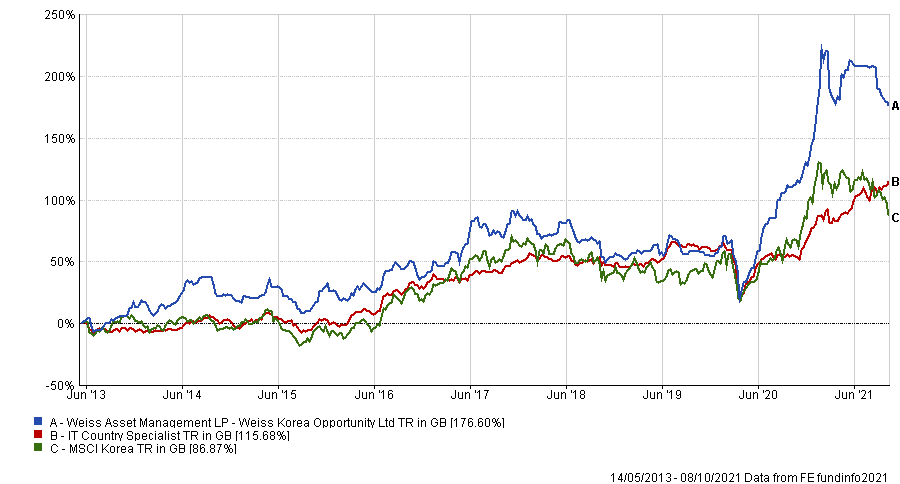An economic anomaly is a situation that according to standard economic models – should not exist or should seldom persist.
However, there is an economic anomaly in South Korea that has seemed to persist for the past eight years, enabling a hedge-fund run specialist investment trust to double the returns of the wider market.
In South Korea, there are preference shares of public companies that are essentially the same as common shares, except they do not have voting rights.
These preference shares often trade at deep discounts to the common stock, despite being entitled to the same economics and yielding an extra nominal dividend payment.
They can trade at discounts of more than 50% – which means that investors can buy shares for half the price and receive double the dividend yield – not including the extra nominal dividend payment.
“These non-voting shares are trading at just irrational discounts,” said Jack Hsiao, a managing director at Weiss Asset Management. “They’re just way too big. It’s a big economic anomaly.”
This is why Weiss Asset Management, the Boston-based hedge fund founded by renowned American economist Andrew Weiss, launched the Weiss Korea Opportunity trust in 2013. Since then, it has more than doubled the returns of the wider MSCI Korea benchmark and has been a top-quartile performer among all investment trusts.
Performance of the trust versus sector and benchmark since inception

Source: FE Analytics
A large part of the outperformance of the trust has come from the discounts between preference shares and common shares narrowing, Hsiao revealed.
However, another meaningful source of returns comes from the extra dividend yield that buying these deeply discounted preference shares allows.
“We're able to purchase some of these large cap stocks like Hyundai Motors at more than half off, so effectively our portfolio receives double the yield than if you were holding the index or those voting shares in your portfolio,” Hsiao explained.
“There's this notion of a Korea discount, maybe because of geopolitical risks, maybe because of corporate governance issues five or 10 years ago, and so from a price-to-earnings perspective, Korea is at a 25% to 30% discount to some of its peers.”
But Hsiao’s added that this discount was surprising given that South Korea is one of the most innovative countries in the world.
The Bloomberg Innovation index for example, ranked it first for innovation last year. It has also regularly ranked within the top three or five countries for the past several years.
“It is a country where we do feel like there is a lot of kind of growth potential, but people typically treat it as a value play,” Hsiao continued.
“For example, one third of global electric vehicle batteries are manufactured out of South Korea. That's because a lot of these large companies had spent years doing the research and development for lithium ion and for these new green initiatives that are going on across the world.”
One such company is Doosan Fuel Cell, a leader in hydrogen fuel cell technology that is set to benefit from the world’s push for green technology – where the trust has a top-10 position via preference shares.
“Those preference shares are trading at a 70% discount, which is incredible,” Hsiao said. “If those things even traded up to kind of where the common shares are, not only do we get fuel cell exposure, we’ll probably make another 250% on capital deployed.”
But if the opportunity is so clear and in plain view, why is there such a huge discount?
One reason could be due to the history of South Korean public companies and the degree of control the Chaebol has exerted over them. The Chaebol are the large family-owned conglomerates that still control most of Korea’s public companies.
Despite the corporate governance issues that still exist, Hsiao said the number of public engagement and activism cases for Korean public companies is rising steadily.
“It has gone from zero cases in 2013 to high singles and double digits in the past few years,” he said.
Hsiao added that there seems to be an “unmistakable trend” of an increased willingness to talk to public companies and a less of a reluctance to let a Chaebol family allocate capital as freely as before.
Another reason he suspects there is still a discount is because Korean preference shares are still very under-followed by the global market and the investment universe isn’t that large.
“It's not something where you can dump $3bn into,” he said. “There isn’t unlimited capital capacity so it might fly under the radar of a lot the largest institutions just because the amount that you can deploy into it is small.”
Additionally, when big institutional investors that do own preference shares need to sell – it can be problematic.
“If the [large institutions] need to exit, or maybe they are looking to rebalance their portfolio, if there isn't a natural buyer in the market it is very easy for these things to widen out to a very big discount while these guys are selling,” Hsiao explained.
However, it can also provide just the sort of opportunity that the trust looks for.
Hsiao recalled how during the depths of the March 2020 sell-off, many institutional pension funds that were holding preference shares in Hyundai motors had to sell and the discount widened to as much as 60%.
“It was just way lower than where the average and median had been for the past five years,” he said.
“Situations like that we see as really good trading and investment opportunities, being able to buy some of these at really irrational prices just because there's a seller without the necessary liquidity in the market.”





